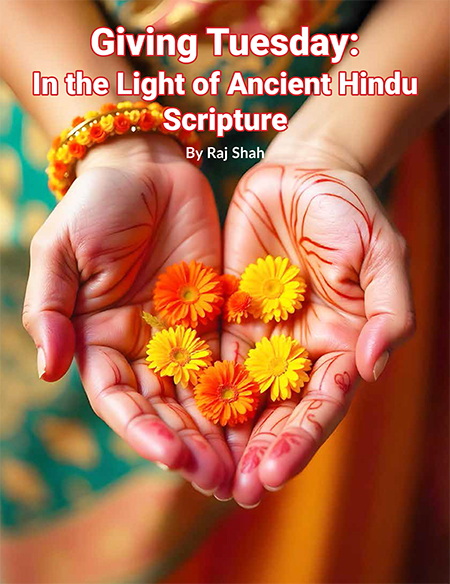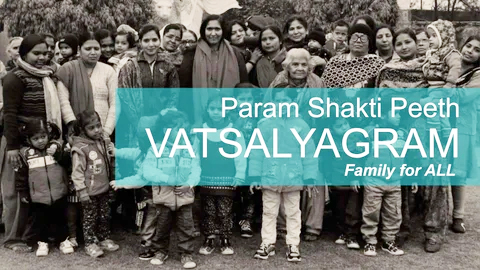Giving Tuesday: In the Light of Ancient Hindu Scripture

By Raj Shah
November is a month of gratitude and giving. The United States observes it as National Gratitude Month, a time to reflect on our blessings and express gratitude in meaningful ways. Thanksgiving, a holiday devoted to giving thanks for the harvest and blessings of the past year, is one of the central observances in November. Closely following Thanksgiving is Giving Tuesday, a global day of giving that encourages people to support charitable causes. Held on the Tuesday after Thanksgiving, Giving Tuesday has become a powerful movement that fosters generosity and compassion worldwide.
This year, Giving Tuesday coincides with the Hindu festival of Diwali, making November an especially meaningful time for reflection on charity and generosity. Diwali, also known as the Festival of Lights, celebrates the triumph of good over evil and light over darkness. It is a time for family, community, and the expression of gratitude through acts of kindness and charity. Diwali encourages the giving of gifts, food, and donations to those less fortunate, making it an ideal time to engage in charitable activities and reflect on the values of compassion and generosity that both Giving Tuesday and Diwali share.
Giving Tuesday and Diwali is a reminder that amidst the holiday season’s commercial rush, there is an opportunity to pause, reflect, and share with those in need. It allows individuals, communities, businesses, and organizations to come together to support charitable initiatives, volunteer their time, and contribute to the well-being of society. What makes these days so significant is that it transcends borders and beliefs, focusing on the universal act of giving.
Charity in Hindu Scripture: Dāna as an Essential Virtue
In Hinduism, charity, known as dāna, is considered a fundamental virtue and an essential part of righteous living. It is a practice that transcends mere generosity, becoming a spiritual duty that must be performed with purity of heart and without selfish motives. The concept of dāna is deeply rooted in Hindu scripture, including the Bhagavad Gita, which emphasizes that charity must be performed selflessly, out of a sense of duty, and not for personal gain or recognition.
The Bhagavad Gita, one of Hinduism’s most revered texts, teaches that charity is one of the highest forms of service and should be performed without any expectation of return. In Chapter 17, Verse 20, the Gita states, “A gift which is given without any expectation of return, at the right place and time, and to a worthy person, is considered to be sattvik (pure) charity.” Because it stems solely from the desire to help others, free from ego or personal attachment, this type of charity is considered the most noble.
The Gita’s teachings align closely with the philosophy of Giving Tuesday, which encourages individuals to give without expecting anything in return. Whether it’s donating money to a cause, volunteering time, or supporting a community project, the essence of Giving Tuesday lies in selfless acts of kindness. The emphasis is on giving for the sake of giving, knowing that the act itself enriches both the giver and the recipient. Charity, when performed with sincerity and a pure heart, fosters spiritual growth and contributes to the overall well-being of society.
 Diwali and Charity: Illuminating Lives Through Generosity
Diwali and Charity: Illuminating Lives Through Generosity
Diwali, one of the most significant Hindu festivals, is a time of celebration, joy, and reflection. It marks the victory of light over darkness, knowledge over ignorance, and righteousness over evil. Beyond its spiritual and cultural significance, Diwali is also a time for giving, particularly to those in need. People view charitable acts during Diwali as a means to instill light and hope in others, reflecting the festival’s symbolic message of light triumphing over darkness.
During Diwali, many Hindus engage in charitable activities such as donating food, clothing, money, or resources to underprivileged communities. The belief that sharing one’s wealth and resources with others purifies the soul and cultivates virtues such as compassion, empathy, and humility deeply roots this tradition of giving. Diwali’s association with charity extends beyond its cultural roots, as it serves as a spiritual practice that aligns oneself with the divine principle of selflessness.
This year, as Diwali and Giving Tuesday fall in close proximity, it offers a unique opportunity for individuals to reflect on the importance of charity in their lives. The convergence of these two occasions creates a powerful moment for people from different cultures and backgrounds to unite in the spirit of generosity. Whether through small acts of kindness or larger contributions, the values of Giving Tuesday and Diwali encourage us to share our blessings with others, illuminating lives and uplifting communities.
Thirukkural and the Timeless Wisdom of Charity
The importance of charity is a universal concept, found not only in Hindu scriptures but also in other ancient Hindu texts, such as the Thirukkural. Composed by the Tamil poet-saint Thiruvalluvar, the Thirukkural is a collection of 1,330 couplets that provide ethical guidance on various aspects of life, including the virtue of charity. Thiruvalluvar emphasizes that sharing wealth instead of hoarding it brings lasting happiness to both the giver and the receiver.
Here are some key verses from the Thirukkural on the topic of charity:
- Giving to the poor is true charity.
- All other giving expects some return.
- Great indeed is the power to endure hunger.
- Greater still is the power to relieve others’ hunger.
- The benevolent expect no return for their dutiful giving.
- The worthy work diligently to acquire wealth in order to meet the needs of the deserving.
- Of all duties, none is better than benevolence, whether in this world or that of the Gods.
- One could compare the wealth of a community-loving wise man to a well-filled village water tank.
In Verse 221, Thiruvalluvar writes, “The wealth of the benevolent is like a fruitful tree, which extends its shade and offers its fruits to all.” This beautiful metaphor captures the essence of charity as an act that benefits not only the recipient but also enriches the life of the giver. Just as a tree provides shelter and nourishment to those who seek it, a person who practices charity spreads comfort and well-being to others. The act of giving, like the tree’s shade and fruit, is a source of joy and sustenance for all.
 The Thirukkural also emphasizes the importance of performing charity with a pure heart, devoid of any selfish motives. In Verse 216, it states, “The gift of the unselfish, pure in mind, will bring them lasting fame and honor.” This lesson aligns perfectly with the spirit of Giving Tuesday, where the focus is on donating without expecting any return. True charity, according to the Thirukkural, is an act of selflessness that elevates both the giver and the recipient, creating a bond of mutual respect and compassion.
The Thirukkural also emphasizes the importance of performing charity with a pure heart, devoid of any selfish motives. In Verse 216, it states, “The gift of the unselfish, pure in mind, will bring them lasting fame and honor.” This lesson aligns perfectly with the spirit of Giving Tuesday, where the focus is on donating without expecting any return. True charity, according to the Thirukkural, is an act of selflessness that elevates both the giver and the recipient, creating a bond of mutual respect and compassion.
Thiruvalluvar further warns against the dangers of hoarding wealth and failing to share it with others. In Verse 227, he writes, “More bitter than even a beggar’s bread is the meal of the miser who hoards wealth and eats alone.” This verse highlights the emptiness and bitterness that come with selfishness, contrasting it with the joy and fulfillment that arise from sharing one’s wealth with others. The Thirukkural reminds us that wealth, when used for the benefit of others, becomes a powerful tool for creating a more just and compassionate society.
The Profound Joy of Giving
Both Hindu scripture and the Thirukkural emphasize that charity is not merely a duty but a source of profound joy. When we give selflessly, we experience a deep sense of fulfillment and happiness that comes from knowing we have made a positive impact on someone else’s life. In Verse 225, Thiruvalluvar writes, “Great, indeed, is the power to endure hunger. Greater still is the power to relieve others’ hunger.” This verse reflects the idea that while it takes strength to endure suffering, it takes even greater strength and compassion to alleviate the suffering of others.
The giver and recipient are transformed by giving. It helps us transcend our individual concerns and connect with the larger human family. Charity, in this sense, is a way to cultivate empathy, humility, and a sense of interconnectedness. Whether it is through donating resources, offering emotional support, or simply being present for someone in need, the act of giving enriches our lives and brings us closer to our true selves.
 Giving Tuesday: A Modern Reflection of Ancient Values
Giving Tuesday: A Modern Reflection of Ancient Values
The modern concept of Giving Tuesday deeply aligns with the principles of charity found in the Bhagavad Gita, the Thirukkural, and other sacred texts. Both emphasize the importance of selfless giving, compassion, and the understanding that true wealth lies in the ability to share with others. In today’s world, where inequality, poverty, and suffering are prevalent, Giving Tuesday provides a platform for individuals, organizations, and communities to come together in the spirit of generosity.
Hinduism and the Thirukkural remind us that charity is not just an act of kindness, but a moral and spiritual obligation that elevates both the giver and the receiver. By practicing selfless giving, we can honor the ancient wisdom of our spiritual traditions and make a positive impact on the lives of those around us. Whether through financial donations, volunteering time, or offering a helping hand, every act of charity contributes to the greater good and helps create a more compassionate and equitable world.
This November, as National Gratitude Month, Giving Tuesday, and Diwali converge, let us take this opportunity to reflect on the importance of charity in our lives. By embodying the principles of selflessness, compassion, and generosity, we can bring light into the world and experience the profound joy that comes from living with an open and generous heart.
Charities that are near and dear to my heart
I support three charities connected with education in India because I deeply value education, especially given my family’s strong ties to this field. My father founded a school in India, which became a cornerstone of our community. In addition, my brother, his wife, and all three of my sisters followed in his footsteps, serving as dedicated teachers there. Their commitment to shaping young minds has profoundly influenced me, and I believe education is the key to uplifting individuals and communities. By supporting these charities, I hope to contribute to the same cause that my family has championed for generations.
 About the Author:
About the Author:
A software engineer by profession, Indian culture enthusiast, ardent promoter of hinduism, and a cancer survivor, Raj Shah is a managing editor of Desh-Videsh Magazine and co-founder of Desh Videsh Media Group. Promoting the rich culture and heritage of India and Hinduism has been his motto ever since he arrived in the US in 1969.
He has been instrumental in starting and promoting several community organizations such as the Indian Religious and Cultural Center and International Hindu University. Raj has written two books on Hinduism titled Chronology of Hinduism and Understanding Hinduism. He has also written several children books focusing on Hindu culture and religion.
 Akshaya Patra Foundation
Akshaya Patra Foundation
No child in India shall be deprived of education because of hunger
MISSION : To feed 3 million children every day by 2025
Akshaya Patra Foundation is the world’s most extensive NGO school meal program, providing hot, nutritious lunches to over 2.2 million children across 24,000 schools in India daily. The organization aims to guarantee that hunger never prevents a child from receiving an education. If you donate $20, it feeds one school kid for the entire year. Please go to the following web site to donate: https://apusa.org/
 The Ekal Vidyalaya Foundation
The Ekal Vidyalaya Foundation
A dollar a day keeps Illiteracy away!
The Ekal Vidyalaya Foundation is an education organization committed to promoting literacy through tribal and rural India. The foundation is working throughout India and has nearly 52,000 teachers. Thousands of these individuals are volunteers, and they provide quality education to children in remote villages in 22 Indian states. A $365 contribution can support a School with 30 children for an entire year!
Please go to the following web site to donate: https://www.ekal.org/us
 Param Shakti Peeth—Vatsalya Gram
Param Shakti Peeth—Vatsalya Gram
Param Pujya Didi Maa Sadhvi Ritambharaji initiated the noble initiative of Param Shakti Peeth—Vatsalya Gram, which aims to establish homes for orphans and
destitute women in India. This initiative provides them with a family structure, education, and training to become global citizens. It also offers professional and vocational training to tribal and abandoned women, enabling them to resettle in their respective areas. Additionally, “Param Shakti Peeth” provides schools and health facilities to aid the needy.
Please go to the following web site to donate: https://pspausa.org/





























